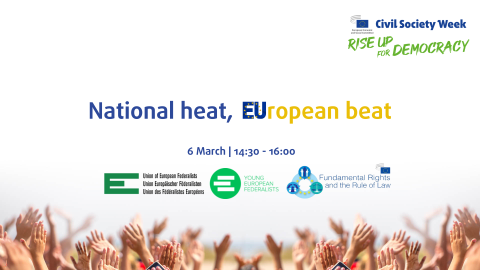European Economic
and Social Committee
National heat, European beat
Webstreaming 06/51 . Back to Agenda
Draft Agenda
14:30-14:40: Introduction by Xesc Mainzer Cardell, JEF Vice-President
14:40-15:10 Part one
The first part of the workshop will be collaborative, aiming to generate ideas for it: together with the audience, we will select two or three areas of interest that are relevant to CSOs and discuss how these topics have been implemented in various countries. We will conclude with an assessment of the current limitations of the EU institutions when it comes to addressing the challenges.
Moderated by Dafne Sgarra, Thematic hub coordinator for Youth Engagement, ALDA.
15:10-15:45 Part two
Panel debate: take stock of what was discussed in the first part, and show how new institutions (established when the Treaties are changed) will bring solutions to the issues highlighted.
- Christian Moos, EESC member Group III – Civil Society Organisations' Group - Divisional Director (European and International Affairs), German Civil Servants Association (dbb); Secretary general of the Europa-Union Germany; board member of the European Movement Germany (EBD)
- Frank Van Bockstal, Deputy Mayor of Etterbeek, in charge of European Affairs
- Alejandro Peinado, UEF EB member and Secretary General of UEF Spain
- Dafne Sgarra, Thematic hub coordinator for Youth Empowerment and Education, ALDA
15:45-15:50 Discussion with the public
15:55-16:00 Conclusions by Flavia Sandu, Policy Officer, UEF
Concept Note
Strengthening CSOs' capacity to bring a European dimension to the national debates and thus provide a meaningful place for the role of the European institutions in public debate. In this way, we aim to create a diverse ecosystem which will enable individuals to debate EU matters as an organic part of the political life of their respective countries.
This workshop will be a two-part workshop/panel discussion about the EU institutions, local and youth participation and the European elections. The list of institutional solutions and actions will be integrated into the workshop report and used as input for the associations co-organising it.
Online interaction will be possible and enable participants to consider possible institutional solutions to the problems identified in part one and ways to deliver them.
